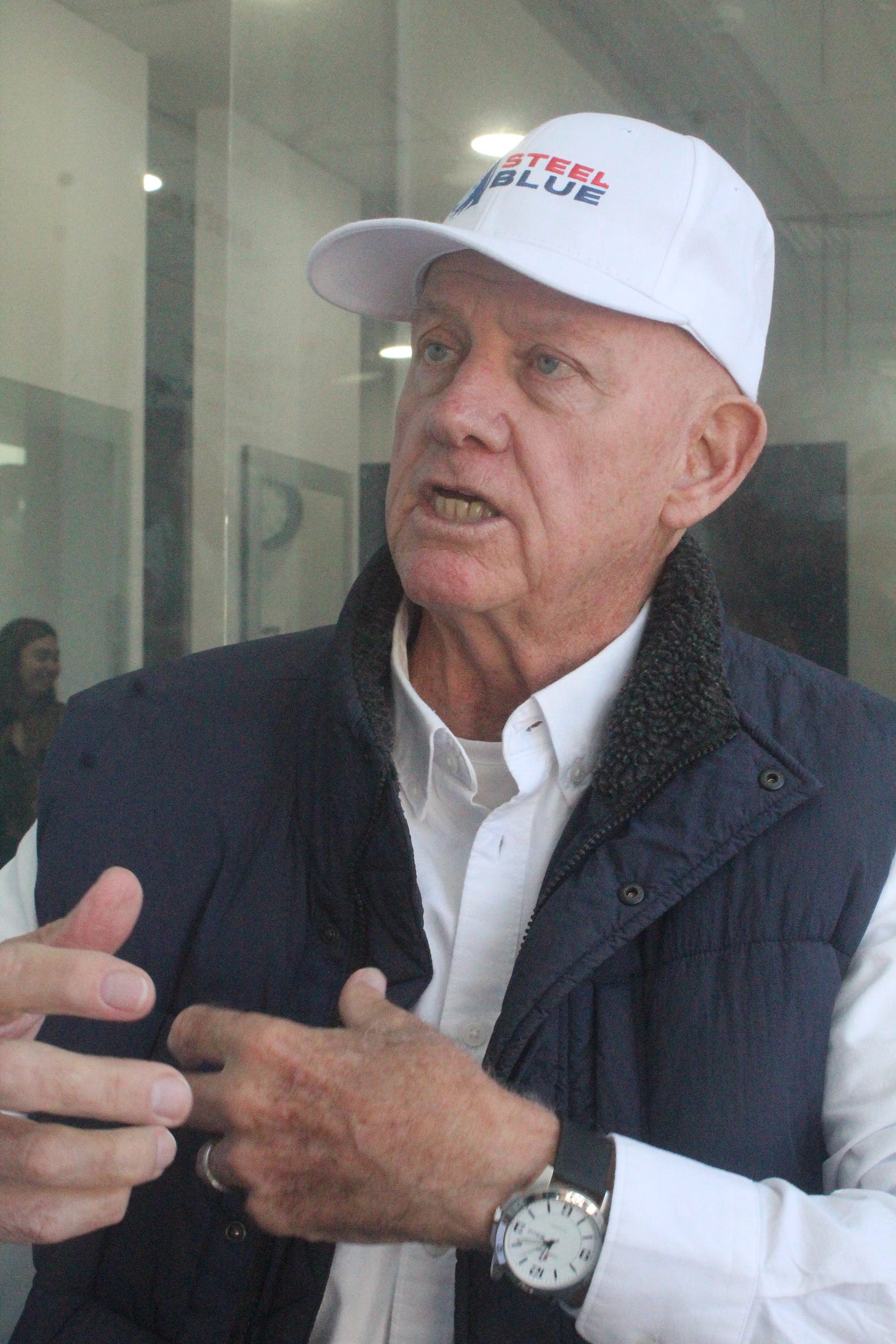GIVING NAYSAYERS THE BOOT
Photo: Erlinawati Graham
Australian Prime Minister Anthony Albanese’s pleas to his nation’s investors to back Indonesian commerce made Greg Johnson yawn – the businessman had heard it all before from a parade of politicians.
But the West Australian and his mates have never followed the NATO (No Action, Talk Only) response; they’ve been putting their money into the country since 1995 by making specialised safety footwear.
“We’ve been developing our technology in Perth and then getting the boots made in Indonesia," he said ahead of another overseas marketing tour.
“We found that Indonesian workers want new skills; they have the right outlook. Employing them and transferring knowledge is most satisfying – to them and us.
“Indonesia is a growth zone; the middle classes are expanding and the opportunities are impressive. What the urgers are saying is right. What’s wrong is that few are being adventurous.”
Steel Blue, the company which makes and exports heavy-duty men’s and women’s work boots mainly with steel toe-caps for the construction industry, now has three factories in West Java and about 1,500 employees – most of them women.
“We are deeply involved with our workers and the community sponsoring sport (mainly soccer) and cancer research. In this environment personal relationships are critical."
In May, PM Albanese made Jakarta the destination for his first overseas trip after winning a national election and a second three-year term for his Australian Labor Party.
After being lavishly hosted by President Prabowo Subianto - who is seeking overseas backers to help development - his guest pleased the Indonesian leader by stressing that Australian businesses should get involved in the Republic:
“The deepening of our trade with Indonesia and the strengthening of investment … is natural and vital - but it is not inevitable.
"To convert extraordinary potential into concrete progress, then all of us — government, business, civil society — need to demonstrate greater engagement and ambition."
In 2020 a free-trade deal - the Indonesia-Australia Comprehensive Economic Partnership Agreement was signed after a decade of negotiations. However, it remains largely stuck with Australia exporting grains and meats.
Some progress has been made with healthcare, renewable energy, agriculture, infrastructure, mining and education where Melbourne’s Monash University has a campus in Bumi Serpong Damai, Southwest Jakarta.
This offers fee-paying post-graduate courses. In Surabaya, Western Sydney University opened a branch last year.
Mt Johnson agreed that 'ambition' was a keyword: "So is resilience and adaptability, and for sure there’ll be difficulties.
“I was in Jakarta when there were anti-Japanese protests in 1974 - but these issues have to be overcome. You need to be serious and stay the distance.”
(The Malari incident of violent anti-Japanese protests started during a visit by PM Kakuei Tanaka against corruption and unequal foreign investments. Since then, new laws have helped native Indonesians get involved in overseas-powered ventures.)
The relationship recovered. Japan is now Indonesia’s fourth largest investor, mainly in making vehicle parts, while Australia lags around 14th place, far behind the biggies like Singapore, China, Malaysia, Hong Kong and the US.
A deterrent to those concerned about global warming is that Indonesia relies heavily on generating electricity by burning coal; Australia is switching to natural energy, particularly solar and wind power.
The Steel Blue director, now in his “early 70s”, has had a few health scares – some of them treated in Indonesian hospitals. He rejected tabloid media reports that medical care is sub-standard: “I’ve been impressed by the professionalism and services.
“Some of my problems have come from stress which is a bit of a Western disease. Indonesian culture is more relaxed and that’s beneficial.
“Indonesians’ attitudes are far more gracious. Put up a proposal in Australia and the answer is often a list of rules – in effect, saying ‘no’. We've become litigious and arrogant.
“In Indonesia, the welcome is likely to be: How can we help you?
“Finding a trusted partner in Indonesia is essential – completely and totally. I’ve been around the world and know that person-to-person contacts are critical. That’s why I’m so annoyed with the Australian government’s approach to visas.”
Mr Johnson is also a director of the Perth-based Indonesia Institute that has been campaigning for a better deal for Indonesians wanting to visit Down Under. In a submission to a parliamentary inquiry, he and his colleagues highlighted the discrimination against Indonesians compared with applicants from Malaysia, Brunei and Singapore.
“They get free Electronic Travel Authority visas online – a facility not available to Indonesians who have to pay $195 a person and lodge a printed form with 16 pages of questions, some inappropriate, culturally insensitive or outdated.
“The future of the Indonesia-Australia trade, tourism and business relationship is highly dependent on the ease of travel. We need to change our mindset.
“This will only be achieved if Australians and Indonesians get to know each other better and more deeply. A transactional approach may work for some countries, but not with Indonesia.”
PM Albanese left Jakarta with promises to fund research programmes and green energy. He gave President Prabowo’s cat Bobby a scarf with the slogan: Australia loves Indonesia.
But no easing of visa rules.
“Indonesia has been good to me and our company,” said Greg Johnson. “I hope we’ve been good to Indonesia – and I want others to follow.”
##
First published in Indonesia Expat, August 2025: https://online.fliphtml5.com/qinqh/qhpt/#p=16



Australian Politicians have come and gone to Indonesia since the late 80’s in my personal experience, Hawke, Keating, Howard, etc all spouting the same as Albanese presently is. What’s changed for the better in almost fifty years, not a hell of a lot in terms of improving business and Government to Government relations on business expansion and support. And as for visas and encouraging Indonesian employment participation in Australia - Grrrrrr!!